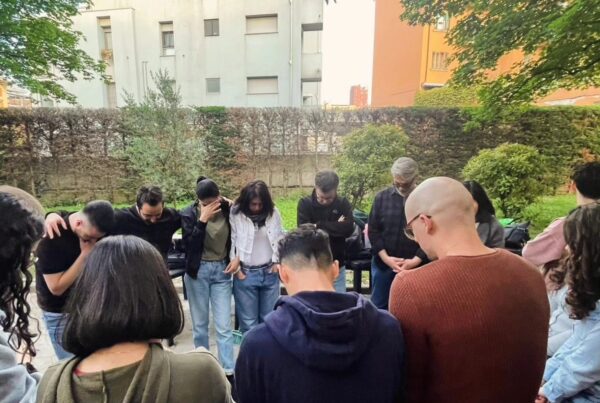History teaches us that one of the main reasons for wartime success is the quantity and the quality of the soldiers who get deployed for battle. The same principle, of course, holds true for church planting. We can have all the good intentions in the world, but without qualified and competent church planters continually coming through the ranks, our efforts as a church planting movement will be in vain.
Without qualified church planters coming through the ranks, our efforts as a church planting movement are in vain
This, however, begs the question: whose responsibility is it to raise up a next generation of church planters? Is it God’s responsibility to call and commission a new army of church planters? Or is it our responsibility to draft and deploy these men? The answer, as so often is the case, is “both”.
1. Jesus’ command
As he was ministering throughout all the cities and villages of Galilee, Jesus had compassion for the crowds, because they were “like sheep without a shepherd” (Mt 9:35-36). And so Jesus said to his disciples, “The harvest is plentiful, but the laborers are few; therefore pray earnestly to the Lord of the harvest to send out laborers into his harvest.” (Mt 9:37-38)
Jesus is saying that although he himself is the Chief Shepherd of his flock, there is a great need for “under-shepherds”, or (changing metaphors) laborers to assist him with Kingdom harvesting. The reason for more laborers is twofold:
- Firstly, the harvest is plentiful. In other words, the Lord has a people who belong to him and they are ripe for the picking (Acts 18:10).
- However, the laborers are few. There simply aren’t enough “under-shepherds” available to match the task at hand.
And so Jesus commands his disciples to pray. He commands us to pray and plead with the Lord to send out more laborers. We can have confidence that he will answer our earnest prayers in this regard, for he is the “Lord of the harvest”. It is after all “his harvest”.
Could this be the reason why we do not see enough church planters come through our ranks? Could it be that we do not have, because we do not ask? Could it be that when we ask we do not receive, because we ask wrongly, seeking to spend it on our own passions? Seeking to build our kingdoms and not his?
The harvest is plentiful not miniscule. The laborers are few not many. He is the Lord of the harvest not us.
The truth of the matter is that we are a generation that run the risk of becoming so self-sufficient, so confident in our own abilities and resources that we hardly ever stop and pray to the Lord to raise up new laborers. Our prayerlessness in this regard, or at best our lack of earnestness when praying for laborers, reveal that we may have lost perspective with regards to the mission at hand: “The harvest is plentiful”, not miniscule. “The laborers are few”, not many. He is the “Lord of the harvest”, not us. It is “his harvest”, not ours.
However, Jesus’ command in Mt 9:38 raises another important question: What would it look like if the Lord were to answer our prayers and send out laborers into the harvest? What are the means by which the Lord will raise up a next generation of church planters?
2. Paul’s command
In his second letter to his former apprentice, Paul exhorts Timothy to be a faithful minister of the gospel. Timothy was not to be ashamed of the gospel (1:8). He had to guard the gospel (1:14). And he was instructed to pass the gospel-baton on to the next generation…
You then, my child, be strengthened by the grace that is in Christ Jesus, and what you have heard from me in the presence of many witnesses entrust to faithful men who will be able to teach others also. (2 Tim 2:1-2)
Paul commands Timothy in verse 2 to purposefully entrust the next generation of workers with the gospel. It implies that there was some process by which Timothy could identify who the faithful men are, and also a plan to ensure that these faithful men would in fact be able to teach others also.
Now how does one reconcile Paul’s instruction here with Jesus’ command in Mt 9:38? Was Paul being ‘unspiritual’ and forgetting that it is the Lord’s responsibility to send out laborers into his harvest? The answer is of course ‘no’, and is confirmed by the first command that Paul gives Timothy in chapter two verse one: be strengthened by the grace that is in Christ Jesus, AND…”
The “and” at the beginning of verse 2 is so crucial. It connects Paul’s command in verse 1, with his command in verse 2. Paul was hereby not only exhorting Timothy to raise up laborers for the harvest, but reminding him that he would only be able to do it if he continued to find his strength in the gospel of grace.
Paul understood that the Lord’s grace was not only the means of our salvation, but also of our service. He understood that we are not only saved by grace, but also sent out by it. And so Paul could elsewhere say: “I worked harder than any of them, though it was not I, but the grace of God that is with me” (1 Cor 15:10)
Let’s pray, and let’s get to work.
As individuals and churches that long to see a next generation of church planters come through the ranks, we should never lose this biblical balance. We should make sure that we do not fall off either side of the proverbial horse. Let us remember who the Lord of the harvest is, and in so doing, pray earnestly to him to send out laborers into his harvest. But let us also remember that when he answers our prayers in this regard, he will not bypass the church, but will rather empower us for this great task. So let’s pray; and let’s get to work.
Johan Verster (@Johan_Verster) is one of the lead pastors of LIGpunt Church, Pretoria, South Africa. He originally studied and worked as an accountant but came to faith in Christ while living and working in London, UK. Following a few years of working for the “Co-Mission” – a church planting network in, and for London – Johan relocated to Cape Town, South Africa to do his BTh at George Whitfield College. Following completion of his studies, he and co-pastor Tobie Meyer relocated to Pretoria in order to plant LIGpunt. They also launched “TRANSmission” in 2011, a ministry training scheme that seeks to identify, train and release a next generation of church planters for Africa. Johan is married to Anchen and they have four children – Liam, Anaïs, Maya and Finn.










